Northern convoys. Part II
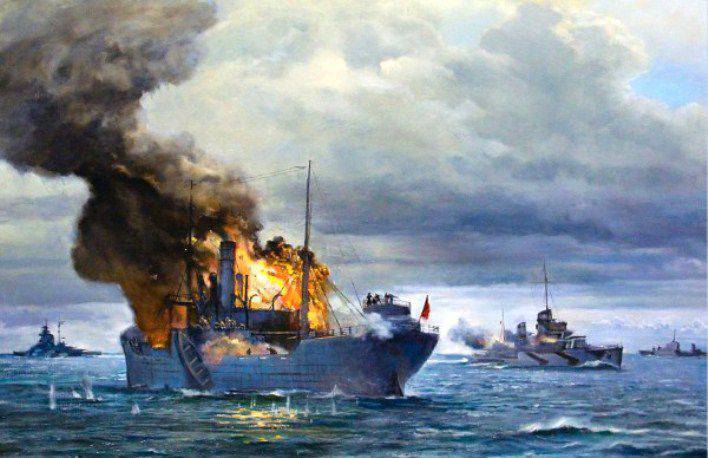
The fate of the convoy "PQ-17" is very dramatic. On June 27, 1942, he left the Icelandic Hwal fiord and went east in an eight-node move. The convoy had 37 transports packed with a wide variety of military cargoes. Their cost was about 700 million dollars. Escort united 19 warships and was concentrated under the command of Captain 3 Rank Brum. In addition, two groups of cover ships followed the escort. The first, Rear Admiral Hamilton, consisting of 4 cruisers and 3 destroyers. And the second - the commander fleet Metropolitan Admiral Tovey, consisting of the battleships “Duke of York” and “Washington”, 2 cruisers, 8 destroyers and the aircraft carrier “Victorios”. The convoy was also accompanied by 11 submarines.
Trouble began even at sea. Above the water surface kept the fog, the court maneuvered blindly. The American ship Richard Bland hit a rock, got a hole and in distress gave a distress signal, breaking the radio silence. After a while, two vehicles damaged their hulls on the floating ice. All 3 vehicles are back. And the secrecy of the exit convoy was violated. It is true to note that the German intelligence network reported on the forthcoming exit of the convoy in early June. He was guarded by German submarines and reconnaissance aircraft.
Despite the preparations of the enemy, the bulk of the way the caravan of ships went unnoticed. And only on July 1, he was discovered by the U-456 submarine, which 2 months ago the Edinburgh cruiser and the plane torpedoed. On the maps of the operational divisions of the fascist fleet, flags indicating submarines began to move, they began to relocate. Behind the caravan, keeping in touch, the “wolf pack”, which gathered up to ten boats, was tied. At the airdromes preparing for flights aviation. Hitler's command declared the convoy "PQ-17" as the main target, it had to be completely destroyed. Massive attacks began after 4 days. The first day, 4 vehicles were carried to the bottom. The situation was heating up. And at the time of critical climax, the incomprehensible happened. From the British Admiralty came urgent secret radiograms: “Cruisers to go west at full speed”; “In connection with the increased threat of surface ships, convoy vessels disperse and make their way to Soviet ports on their own.” The cover ships, following the order, threw the caravan transports to their own devices. With them went 6 destroyers of direct protection.
What happened? The German command, deciding to destroy the convoy, gave the order to prepare for the launch of its largest battleship Tirpitz, the heavy cruisers Admiral Hipper, Lutzov Admiral Scheer and the destroyer group. Receiving this information from intelligence sources and, not wanting to put their fleet at risk, the British Admiralty threw a panicked cry: "Save yourself who can!", Returned the covering forces and took a wait-and-see attitude. The convoy "РQ-17" seemed to play the role of bait.
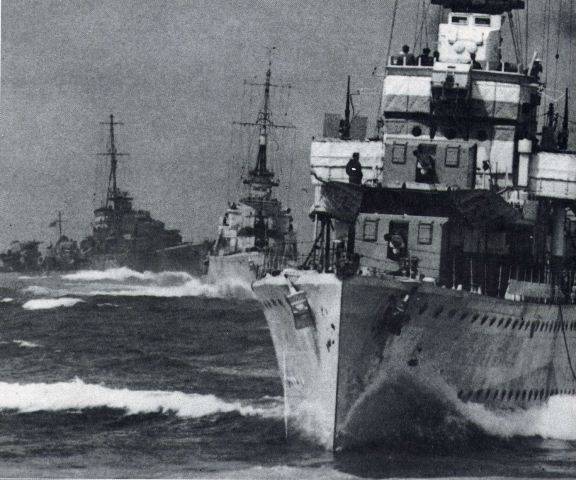
Further events unfolded as follows. When the Lutz and 3 destroyers hit the cliffs, they were forced to abandon the squadron. The battleship "Tirpitz" in this campaign was attacked by a Soviet submarine "K-21" under the command of Nikolai Lunin. In an effort to avoid further losses, the German fleet command canceled Knights Mov, and ordered the return of surface ships to the bases. Thus, the main forces of the opposing fleets dispersed without a decisive battle, and the disarmed convoy “PQ-17” became easy prey for fascist aircraft and submarines.
The first military loss of the convoy was the ship "Christopher Newport" type "Liberty". He was struck in the engine room torpedo, fired by a German submarine. The lost ship began to helplessly describe the circulation, passing through the sixth and seventh columns of the convoy. Only due to a happy occasion it did not collide with other transports. In the end, the ship turned in the direction opposite to the movement of the caravan, and stopped. The crew of "Christopher Newport" was not particularly waiting for the order to leave the transport: even before the torpedo hit the side of the ship, 4 was ready to descend the boat on the davits. 2 of them were destroyed by the explosion, and the second pair was already moving away from the side.
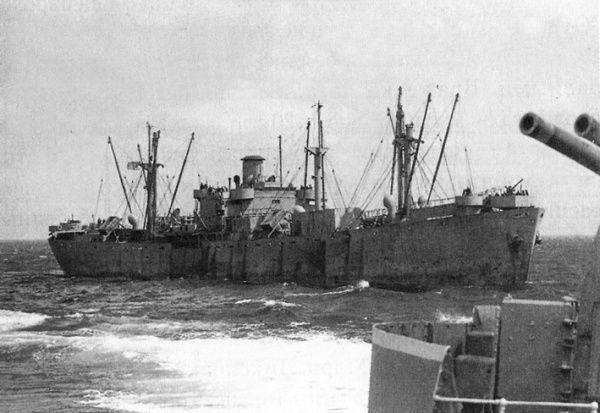
A completely new transport vessel of the Liberty type with all valuable cargo was thrown in the middle of the sea. A few hours later, he was finished off by a suitable German submarine. So 4 tragically began July - US Independence Day. And most of the ships of this caravan were American.
Early in the morning of July 5, on the horizon, behind the stern of Samuel Chase transport, observers noticed a black dot, which they identified as a German submarine. In 10.00, the submarine has disappeared from view. In 10.30, the captain gave the order: "For the vehicles - full back, the crew - to take seats in the boats". In 10.45, all the lifeboats were lowered and moved away from the vessel. For two hours the sailors were waiting for a torpedo attack. After which the captain decided that the submarine had left their ship alone. In 14.00, all the lifeboats were lifted aboard again. The vessel "Samuel Chase" was one of the few vessels that managed to avoid death in that voyage.
Over the American transport "Alcove Ranger" for a long time circled the German reconnaissance aircraft. The captain of this vessel, the US Navy reserve officer H. Christofsen, ordered to raise an international vault signal, meaning unconditional surrender. He also ordered the American stars and stripes to be lowered, and the sailors would be placed in lifeboats. However, the German plane suddenly disappeared over the horizon. The assistant captain took command of the transport and offered volunteers to continue sailing, and the captain was sent to the lower premises of the vessel for house arrest.
In the holds of the ship "Yelston" were boxes of ammunition and hundreds of tons of explosives. An unknown one that appeared from nowhere, the single Junkers passed over the masts of the ship and dropped one bomb. She did not get into transport, but exploded near the starboard. The cars stopped, the ship stopped. Captain Stenwick ordered the crew to leave the transport. No sooner had the boats moved away from the “Jelston” by a quarter of a mile, as two German submarines almost immediately appeared on the right side of the ship ... A little later, another submarine came up to the surface and fired a torpedo over the ship. The deadly cigar hit the side, the transport tilted slightly, but remained afloat. The second torpedo passed by. The third torpedo landed in the second hold loaded with explosives ... At some point, the sailors in the boats seemed that the torpedo did not explode. But then a blinding flash of blue flame flashed, and then a column of smoke flew up into the sky, up to a height of 600 meters. The heavy steam catapult was thrown off by an explosion on 400 meters. The body of transport broke in half and went to the bottom.
Captain Winston Salem Lovgren could not stand the nerves. Hearing the alarm, he turned his transport to the nearest bay, it turned out to be Obsedya’s lip and, despite the fog, went to the shore. The vessel was thrown onto the sandy coast almost at a right angle and was deeply entrenched. The team removed the bolts from the guns installed on the ship and threw them into the sea. The documents were burned. After that, the sailors loaded the boats with provisions, tobacco and water and headed towards the nearby abandoned lighthouse.
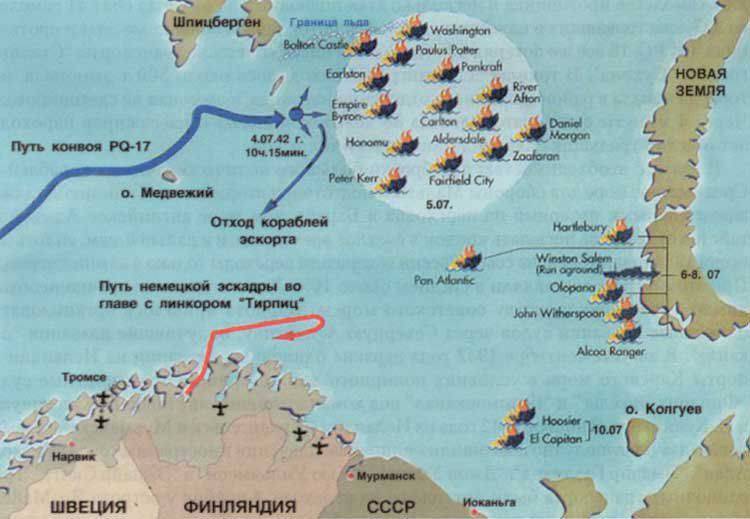
“Winston Salem” was discovered by pilot I. Mazuruk, who made a reconnaissance flight along Novaya Zemlya. Soviet pilot landed near the vessel. Captain Lovgren, who had come to the Soviet crew, was very arrogant: he demanded that a representative of the Soviet government be brought to his island. In response to this, I. Mazuruk presented his badge to the captain of the deputy of the Supreme Soviet of the USSR. After that, Lovgren demanded to free him a seat on the plane and deliver it to the United States. He refused to remove the Winston Salem from the shoal and continue to the port of destination. Attempts to appeal to the conscience of this captain replied that he was not interested in the further fate of transport and cargo, as he had already delivered them to the territory of the USSR.
On the way to Novaya Zemlya, the transport ships of the scattered convoy, mostly one by one, became easy prey for Hitler submarines. They were deservedly called “wolf packs” for their tactics. The overall picture of the defeat of the caravan was terrible.
As a result of the actions of the British Admiralty, out of 34 transports, only 11 escaped death. Together with the dead ships, 432 sunk into the abyss tanks, 216 bombers, 3350 cars and about 100 thousand tons of other military cargoes, so necessary for the USSR to fight the fascists. The convoy "PQ-17" killed 153 civilian sailors. And only 7 of them lost their lives before the convoy dispersed.
Over the entire period of the war in the northern convoys, 829 seafarers perished from 90 ships - an average of 9 per ship. In the PQ-17 convoy, the losses were 6 seafarers per vessel. The English historian concludes on this point: “It seems that the crews were more at the crossing of the PQ-17 convoy, than in other convoys, tend to leave their ships.”
The United Kingdom was unable to provide wiring for the PQ-17 convoy, and doomed it to defeat. Churchill naturally took under his protection the Admiralty and the First Sea Lord of Pound. The Prime Minister, who had previously received the nickname “Sly Fox” from Stalin, used the tragedy of the northern convoy as an excuse to stop sending ships to the USSR. In his message to the USSR government, he indicated: “With a feeling of great regret, we came to the conclusion that an attempt to send the next PQ-18 convoy to the Soviet Union would not be able to do you any good, but on the contrary would cause irreparable damage to our common cause.”
The Supreme Commander had a conversation with the People's Commissar of the Navy. “Was it necessary to leave the convoy?” Asked Stalin. Kuznetsov replied that there were no serious reasons for this. The usual caution this time turned into excessive. And England allowed it, despite its overwhelming superiority in forces. Admiral D. Pound did not want to risk British large ships. This was confirmed by Churchill in the above-mentioned letter: "We do not consider it right to risk our fleet of the metropolis east of Bear Island or where it may be attacked by German aircraft based on the coast."
16 July 1942, General Burns, told the Soviet representative: "The governments of the United States and Great Britain have decided to stop the transport of ships to the northern ports of the Soviet Union." Thus, from July to September 1942, England did not send us a single aircraft.
28 July 1942 was investigated at the House of Commons stories convoy "PQ-17". The British side was attended by Foreign Minister A. Eden, the naval minister Alexander and Admiral D. Pound, from the Soviet side - Ambassador I. Maisky, Admiral N. Kharlamov and his assistant N. Morozovsky. The atmosphere was tense and nervous.
During the discussion, Admiral Kharlamov tactfully, but at the same time quite definitely, stated that the Admiralty made a mistake. Admiral Pound blushed and exploded: “How - did you make a mistake? I gave this order personally! What other options were there then? ”To which Ambassador Maysky objected that sometimes even the English admirals make mistakes. Pound boiled over even more irritably and said that tomorrow he would turn to the Prime Minister to appoint Maisky to command the fleet of Great Britain.
But, despite the sharp disagreements, all questions were discussed. The history of the PQ-17 convoy was carefully concealed from the English and American public. It became widely known only after the end of the war.
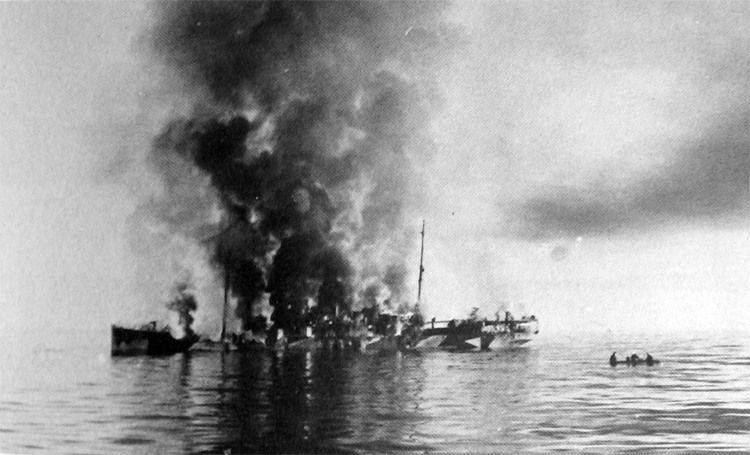
Here are two more assessments of those events. Over time, Winston Churchill admitted that the tragedy “PQ-17” was “one of the saddest episodes of the Second World War”. And Hitler's Admiral Schmundt noted that the defeat was possible "only because of the incomprehensible decision of the convoy commander to disperse the court."
In the most difficult for the Soviet Union period of summer 1942, the Soviet forces lost supplies of weapons and strategic materials from the allies. The German command pulled the additional forces of the Luftwaffe and the submarine fleet to the north.
Only in the middle of September the convoy “PQ-18” headed east. He counted 40 transports. Considering the sad lessons of the last convoy, the British Admiralty assigned 35 warships, including the cruiser, 20 destroyers, and the aircraft carrier Ewendger to guard. The Germans threw 20 submarines, 90 torpedo bombers and 133 bomber onto the convoy. Fascist destroyers put minefields in the path of ships along the coast of the Kola Peninsula. In the same period, the Soviet Union concentrated 300 aircraft in the North, deployed 5 submarines to combat positions.
Between 13 and 16, September, the PQ-18 convoy was subject to continuous attacks. Fascist torpedo bombers managed to sink 10 transports, submarines - 2. But the enemy suffered significant losses - 30 aircraft and 3 submarines. On the approaches to the White Sea, escort of the convoy filled up the Soviet destroyers 4. Here, German aircraft bombed another transport, but lost 15 aircraft.
On September 19, the PQ-18 convoy approached the mouth of the Dvina and was forced to anchor because of the storm. This wanted to take advantage of the German command, sent to the court 24 "Junkers". All of them were dispersed by the fire of escort ships. No transport was injured. In Arkhangelsk, 149 797 tons of military cargoes were unloaded: tanks, ammunition, food.
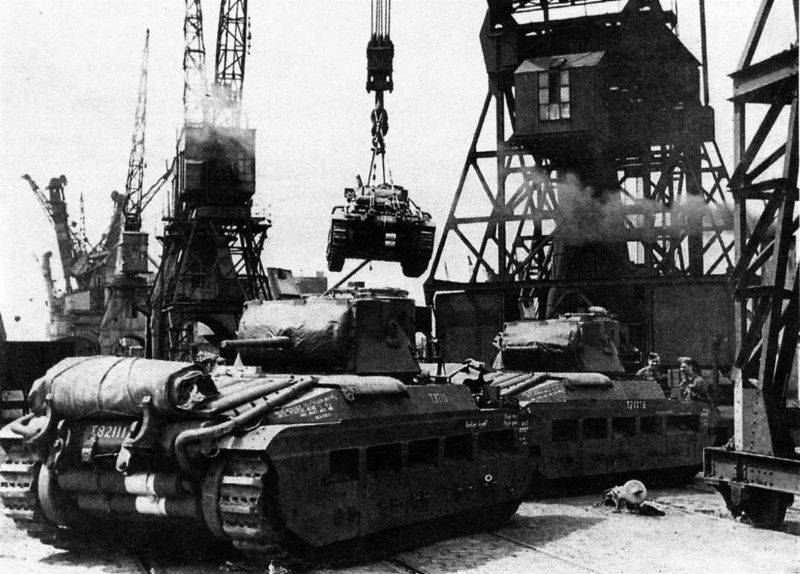
Under various pretexts, the British Admiralty again delayed the exit of the next convoy to our country, although in the English and Icelandic ports there were already loaded 40 transports. The movement of caravans resumed only in the last decade of December, when the convoy “JW-51” arrived in Murmansk. (New indices were introduced: for the following to the east, “JW”, to the west - “RA.”) On the first day of the new 1943, “JW-52” went to the east. The January convoy reached its destination without a loss, but the next two lost several ships.
Prime Minister Churchill on March 30 1943 wrote to Stalin:
“President Roosevelt and I are extremely disappointed by the fact that it is necessary to postpone the convoy scheduled for the month of March. If the German fleet had not concentrated its forces in the northern seas, our decisive intention would be to send you another caravan in March and the next one at the beginning of May, with at least thirty transports each. After the beginning of May, we will no longer be able to continue to send you convoys by the northern route, since we will need every escort ship on the Mediterranean Sea. ” Truly, who wants, he is looking for ways, and who does not want, he is looking for pretexts.
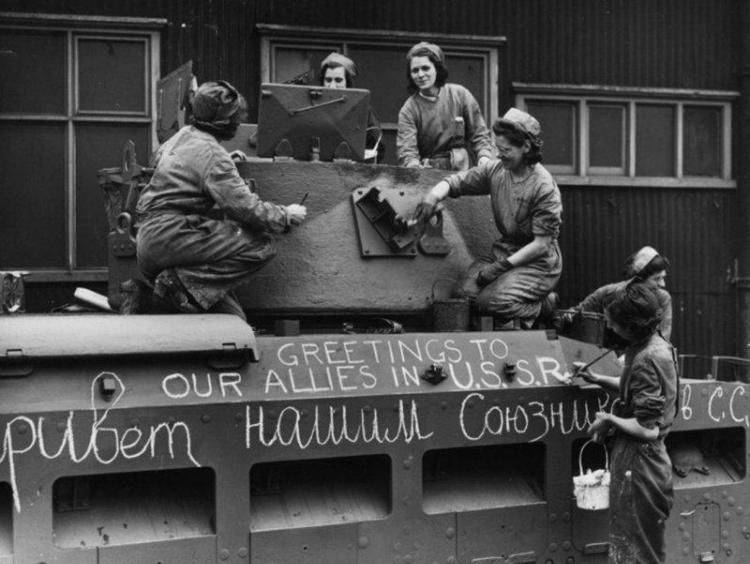
In accordance with the program proclaimed by the Western allies, sea transportation ceased for a long period. There was a summer calm in our northern ports. Numerous British representatives sat idle, but some of our own other "work". In the autumn of 1943, Mr. Stalin wrote indignantly to Churchill that the overwhelming majority of the British servicemen were not used properly and were doomed to idleness for a long time. In addition to inappropriate behavior, on the Soviet territory, there were also cases of attempts by British servicemen to incline the Soviet people to espionage activities. Such relationships did not fit into the concept of allies. The British side frankly demonstrated its traditional principle: “Great Britain has no permanent friends, only its own permanent interests.”
The direction of the Allied convoys to the Soviet ports was resumed only in November. Over the winter came the 191 ship. Thanks to a well-designed organization of the escort, only 3 transport was lost. Fascist aviation and the fleet suffered heavy losses, including the battleship Scharnhorst. But then everything repeated, as in previous years. For the long summer months, until September, the British Admiralty ceased transportation.
Transportation in winter 1944-1945 were lethargic. The story of the northern allied convoys does not end there. As if competing with the British Prime Minister Churchill, Truman made his "contribution", who became the president of the United States after the death of F. Roosevelt. Immediately after the end of the war, despite the fact that the agreed supply program for Lend-Lease was not yet completed, he ordered it to stop and unload dozens of transports already prepared for the flight. Western and modern domestic historians often exaggerate the size and importance of lend-lease supplies. For complete clarity, a few numbers should be mentioned. In general, the US spending on Lend-Lease amounted to 46 billion dollars, of which the USSR accounted for 10,8 billion dollars, and the UK accounted for 30,3 billion dollars. Lend-lease deliveries only slightly supplemented military spending. of our country, which reached 485 billion dollars. The share of Lend-lease military equipment supplies of its quantity produced in those years in the USSR was 2,7% for artillery systems, 7% for tanks and 13% for airplanes. In total, the volume of deliveries under Lend-Lease did not exceed 3-4% of USSR products. It should also be remembered that the courts of many countries took part in the northern convoys. Mostly these were American, British, Canadian transports. A significant volume of traffic was carried out by ships under the flag of the USSR. Moreover, the behavior of Soviet crews in a complex and dangerous situation has always been more heroic and responsible. The exploits of the “Old Bolshevik”, “Donbass”, “Azerbaijan”, and “Vanzetti” who followed Soviet ships in convoys are widely known and described in the literature.
And I think the article should be finished with the words of F. Roosevelt: “We never thought that lend-lease supplies were the main factor in the defeat of Germany. This was achieved by the soldiers of the Red Army, who gave their lives and blood in the fight against the common enemy "
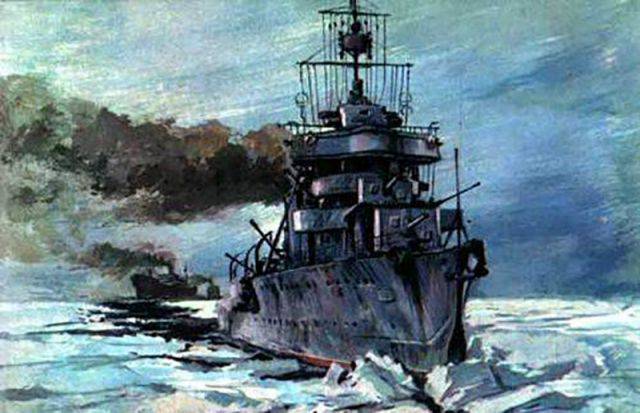
Sources:
Suprun M. Lend-Lease and the Northern Convoys, 1941-1945. M .: St. Andrew's flag, 1996. C. 13-26, 43-57, 92-127.
Koryakin V. The War in the Arctic. 1941-1945. M .: Veche, 2013. C. 32-56.
Puzyrev V., Suprun M., Bogatyrev S, Larintsev R., et al. Northern Convoys. M .: Science, 1994, S. 4-32.
Ivanov K. Konvoi to the north of Russia // Sea Fleet. 1986. No.6. C. 50-52.
Roskill S. Fleet and war. M .: Voenizdat, 1967. C. 128-132.
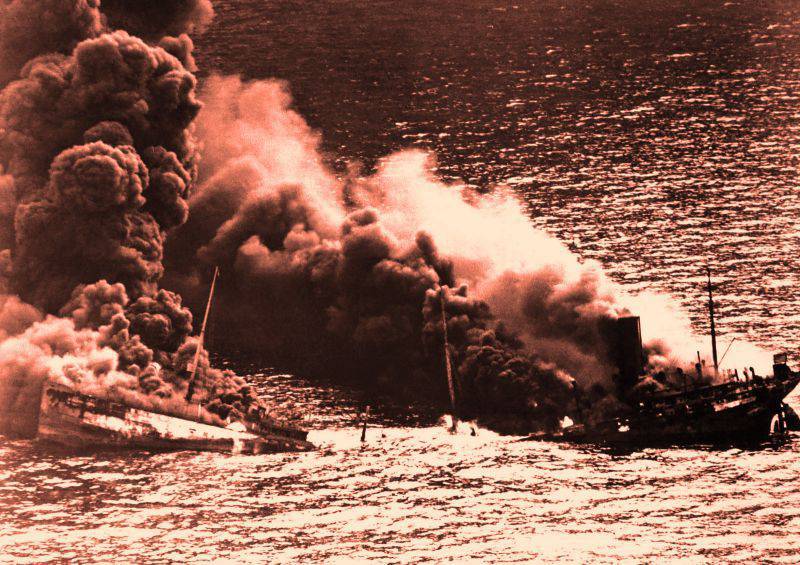
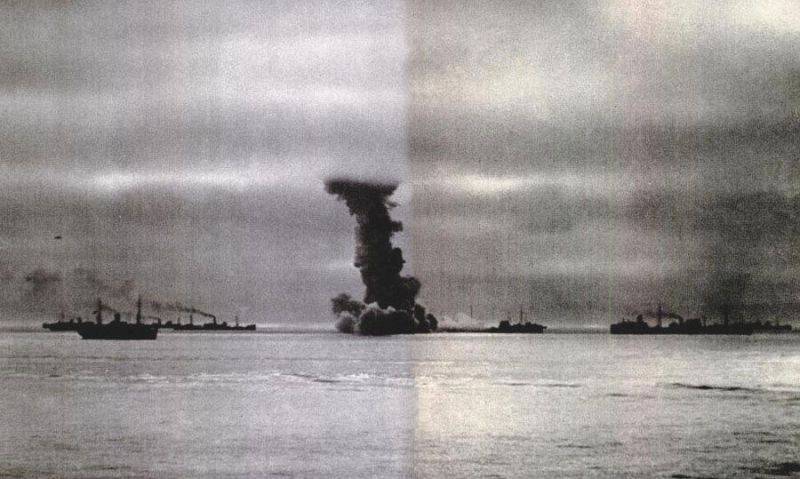
Information